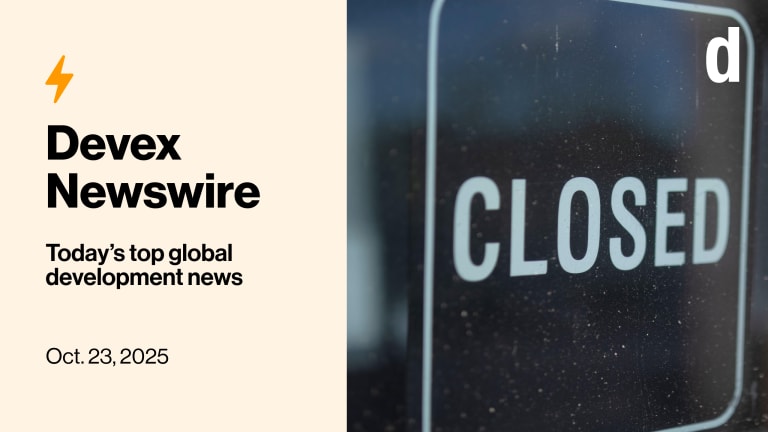Interactive: What can we learn from DFID's disbursements data?
Last week, Devex analyzed the United Kingdom's Department for International Development's disbursements data to identify its top private and NGO contractors. But what can the data tell us about its work with multilateral institutions and foundations?
Last week, Devex analyzed disbursements data from the United Kingdom’s Department for International Development to produce rankings of the aid agency’s top private sector and NGO implementers. But we wanted to know what other insights the data could offer. In this article, we look at what it can tell us about DFID’s work with multilateral development institutions and large foundations. First, some aggregate figures: In 2017, DFID disbursed at least 9.175 billion British pounds ($12,685 billion) to approximately 1,365 recipients — the majority of them implementers of DFID programming. This is slightly different from the 2016 figures: 9.171 billion pounds to 1,646 recipients, reflecting a 17 percent reduction in the number of implementers. Keep reading to explore our interactive chart of DFID disbursements. DFID and other donors In 2017, DFID worked a great deal with several multilateral development banks, bilateral aid agencies, and United Nations agencies — the funding allocated to multilateral and supranational partners far outweighed that allocated to private sector or NGO implementers. Most of these payments reflect the U.K.’s national commitments to these entities. For instance, DFID’s largest commitments to the World Bank reflect the U.K.’s participation in the 17th replenishment of the bank’s International Development Association, to which 399 million pounds were contributed in 2017. Similarly, the U.K. government’s contributions to the U.N. for implementation of the Sustainable Development Goals and Agenda 2030 were channeled through DFID disbursements. Several large disbursements were also made to public health-focused multilateral funds in 2017. Those included 156 million pounds to the International Financing Facility for Immunisation as part of a 1.4 billion pound agreement through to 2020; 209 million pounds to Gavi, the Vaccine Alliance; and 583 million pounds for the Global Fund to Fight Aids, Tuberculosis and Malaria part of it from the U.K.’s 2013-2016 commitment to the fund, and part from its 2017-2020 commitment. Finally, DFID frequently contributes funding to multilateral, supranational, and bilateral organizations to support on-the-ground programming. For example, in 2017, it contributed 91 million pounds to the Asian Development Bank to support its Pakistan Economic Corridors Programme; and 7 million pounds each to USAID’s Health Support Programme in Malawi and GIZ’s global Water Security Programme. DFID and donor foundations Foundations, encompassing both private donors and corporate social responsibility organizations, are also active partners of DFID. However, foundations generally act more as co-funders than as fund recipients in their work with DFID. Perhaps the largest and most well-known is the Bill & Melinda Gates Foundation, which has a long history of collaboration with DFID across sectors such as financial inclusion, agricultural productivity, and public health. For example, a co-funding agreement in Pakistan between DFID and the Gates Foundation led to the development of new digital financial services in the country through local microfinance nonprofit organization Karandaaz. The project led to continued collaboration between Karandaaz and DFID around financial inclusion in Pakistan. In 2017, DFID disbursed approximately 18 million pounds to the Gates Foundation for their work on ongoing programs. Many foundations have sectoral focuses in their work with DFID. The Shell Foundation focuses its work with the department on energy access in Africa, for example, as with the recent Transforming Energy Access program, and the older “affordable appliances” program. Similarly, the GSMA Mobile for Development Foundation works with DFID to drive development using digital and mobile technologies. Since 2016, the two have had a 38 million pound “mobile for development” partnership, and recently signed an additional partnership to focus on humanitarian applications of digital technologies. The disbursements data for 2017 comes at an interesting time. DFID’s work is increasingly under scrutiny, given changes such as the transparency and cross-government agendas that are impacting the U.K. government’s development and aid strategies, as well as several recent scandals affecting the aid sector globally. These could lead to changes in how DFID — and other distributors of U.K. aid — creates business opportunities for development practitioners, whether through reprioritization of sectors or geographies, new procurement policies, or other consequences. This data offers a picture of how things stand at the outset of these changes. Explore it with Devex’s interactive visualization.
Last week, Devex analyzed disbursements data from the United Kingdom’s Department for International Development to produce rankings of the aid agency’s top private sector and NGO implementers.
But we wanted to know what other insights the data could offer. In this article, we look at what it can tell us about DFID’s work with multilateral development institutions and large foundations.
First, some aggregate figures: In 2017, DFID disbursed at least 9.175 billion British pounds ($12,685 billion) to approximately 1,365 recipients — the majority of them implementers of DFID programming. This is slightly different from the 2016 figures: 9.171 billion pounds to 1,646 recipients, reflecting a 17 percent reduction in the number of implementers.
This story is forDevex Promembers
Unlock this story now with a 15-day free trial of Devex Pro.
With a Devex Pro subscription you'll get access to deeper analysis and exclusive insights from our reporters and analysts.
Start my free trialRequest a group subscription Printing articles to share with others is a breach of our terms and conditions and copyright policy. Please use the sharing options on the left side of the article. Devex Pro members may share up to 10 articles per month using the Pro share tool ( ).
Matthew Wolf works with the Devex Analytics team from Johannesburg in South Africa, helping improve our coverage of and insight into development work and funding around the world. He draws on work experience with Thomson Reuters in Africa, MENA and Latin America, where he helped uncover, pursue and win opportunities with local governments and donor agencies. He is interested in data-driven solutions to development challenges, results-based financing, and ICT4D.








